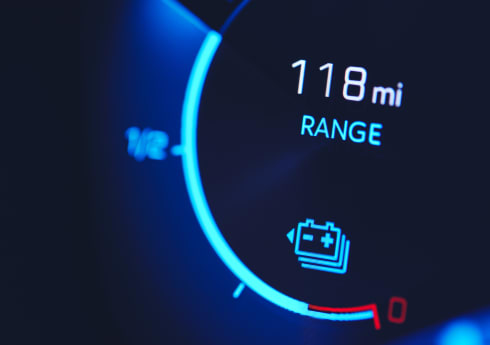Car Accident In Company Vehicle: Who Is Liable?
The UK has the third safest roads in Europe. But if your business depends on drivers, car accident statistics still make for uncomfortable reading.
In 2020, 131,220 people got injured or killed in car accidents, and in most years the figure is much higher. And, more to the point, one in four involve a company vehicle or people driving their private car for work.
Here’s a look at who’d be liable should one of your employees get into a car accident on the job. We’ll also give you some tips on lowering risk and keeping your drivers safer.

Car Accidents in Company Vehicles: When are Employees Liable?
According to the Road Traffic Act, drivers are responsible for the way they drive. This means your employees could be liable for an accident if:
- They’re not properly licensed and insured
- They were driving carelessly or dangerously
- The vehicle was unsafe — this includes driving with cargo that isn’t secured properly
- They haven’t followed your driving policies and procedures (more on this in a minute)
Vehicle tracking can give you a bird’s eye view of your fleet at all times, making it quick and easy to manage all your drivers. You can deal with breakdowns or accidents immediately and even check the driver dashcam footage or speeding incidents from your mobile phone.
As a free comparison site, iCompario can help you find the right system for the right price.
Car Accidents in Company Vehicles: Your Liability as an Employer
While employees have to observe road traffic laws, you’re not off the hook. Employers have a duty of care towards employees. And this means you could be responsible for a road accident if:
- Your employee was driving at work at the time of the accident
- The accident was, at least in part, a result of your failure to carry out your duty of care
When is an Employee Driving at Work?
As a rule, an employee is driving at work — and, so, a duty of care applies — when:
- Driving is part of their job. Run a logistics business? Your employees are driving at work whenever they’re delivering goods.
- They’re travelling somewhere other than their usual workplace. So, if an executive is driving to a client’s office for a meeting, that’s driving at work.
The Health and Safety Executive doesn’t consider commuting to be driving at work. So, a duty of care doesn’t apply — and you can’t be held responsible for accidents — when your employees are:
- Driving to work
- Leaving work for the day
Work with contractors or subcontractors? You’re responsible for their driving too.
How Does the Employer’s Duty of Care Apply to Driving at Work?
As an employer, you have to do everything reasonably possible to ensure your employees’ health, safety and well-being at work. And this extends to driving for work-related reasons.
But what does “everything reasonably possible” actually mean?
The Health and Safety Executive recommends focusing on three main areas:
- Safe driving
- Safe vehicles
- Safe routes
Your Duty of Care and Driving: Safe Driving
Do your drivers have the right skills for the job?
At the very least, they’ll need the correct driving licence. A standard licence is enough for driving vans up to 3.5 kg. But lorry drivers must have a Driver Certificate of Professional Competence in addition to their Class 1 or Class 2 HGV license.
More importantly, you should:
- Regularly check your drivers’ licenses are still valid. You should also look out for any penalty points or other driving offences
- Offer safety training such as defensive driving and other road user awareness
- Make sure employees are physically fit to drive. Heavy Goods Vehicle (HGV) drivers have to have a medical when renewing their licence. But all your drivers should have regular health checks, especially eye exams
- Have a ‘driving at work’ policy and make sure your employees understand it. Here’s a example of a driving at work policy you can use as a template.
Your Duty of Care and Driving: Are Your Vehicles Fit for Purpose?
It goes without saying, but your company vehicles should be:
- Right for the job. A small car is perfect for shuttling employees to and from client meetings around the city. But if you deliver furniture, you’ll need a panel or box van
- Serviced and maintained regularly. Arnold Clark recommends servicing at least every 12,000 miles. And don’t forget your daily walk-around checks. The DVLA has a walk-around checklist you can refer to. Or, you could use an app like Velocity Vehicle Check
- Consider your drivers’. 75% of British drivers have had back problems because of bad driving posture. But bad posture can also lead to fatigue, which increases the chance of accidents. An ergonomic vehicle may be more expensive to buy, but it’ll save on sick days and keep your drivers safer on the road
Your duty of care as an employer applies even if employees use their own car. If any of your employees use their personal vehicles for work, you should check they’re fit for purpose too.
Your Duty of Care and Driving: Are Your Chosen Routes Safe?
B-roads might make sense if your employees are travelling short distances by car. But motorways tend to be the safest option for heavier vehicles.
When picking routes, you should also think about:
- height and weight restrictions on bridges and tunnels
- whether there are service facilities at regular intervals
- traffic
- road and weather conditions
More importantly, ask yourself: are your expectations realistic?
HGV drivers have to take a 45-minute break every 4.5 hours. And they can’t drive more than 10 hours a day or 56 hours a week. But you should set reasonable travel times for all your employees.
The Royal Society for the Prevention of Accidents reckons accidents are more likely:
- When drivers have been driving along a boring stretch of road, such as a motorway, for long hours
- Between 2am and 6am
- Between 2pm and 4pm
- If drivers aren’t well-rested
For this reason, you should encourage employees to take regular breaks. And, you should provide overnight accommodation if they’re driving very long distances.
Vehicle tracking can give you a bird’s eye view of your fleet at all times, making it quick and easy to manage all your drivers. You can deal with breakdowns or accidents immediately and even check the driver dashcam footage or speeding incidents from your mobile phone.
As a free comparison site, iCompario can help you find the right system for the right price.
What to do if there is an accident in a company vehicle?
Obviously the first thing you will be concerned about, should the worst happen, is to check how your employee is after an accident.
If you have a vehicle tracking system installed in your company cars or vans, you will be able to opt for alerts that let you know if there may have been an accident and if you have dashcams as well, you can receive HD video footage immediately to see for yourself what has happened.
Immediately afterwards, you should make your First Notification of Loss (FNOL) to your motor fleet insurance company, or broker if you use one. This means informing your insurer of the accident, whether or not you want to claim (this is a regulatory requirement) and sharing all the details of the incident and the contact details of the other parties involved.
With a prompt FNOL from you and by acting fast and taking control of the situation, your insurer can keep their total costs lower. They can offer a replacement vehicle from their own provider, for example, rather than paying back the other driver’s insurer for a hire vehicle from a rental company of their own choosing. The same principle applies to paying for vehicle repairs and could also apply to medical care, legal fees and other costs.
The longer you delay, the higher the total costs will be to your insurer. This ultimate total cost is what your insurer takes into consideration when preparing your renewal quotation. The higher the price of the insurance claim, the bigger the increase in your renewal premium – not just in the first year but for several years to come.
For more information on motor fleet insurance, visit our Insurance Page.
Final Word
When it comes to driving at work, liability for car accidents is a two-way street. Yes, your employees are responsible for their behaviour behind the wheel. But if they fancy themselves the next Lewis Hamilton, you can’t just shrug your shoulders.
As an employer, you have a duty of care. And having processes and procedures in place is crucial if you want to keep your drivers safe, prove you’ve fulfilled your duty and avoid liability.
Want to reduce the risk of accidents in company vehicles?
What if you could take things further and use technology to track your vehicles, check routes and nip problem driving in the bud?
It would make things even simpler, right?
Well, that’s exactly what vehicle tracking can do.
Find out how it can help you keep your employees safer on the road.


